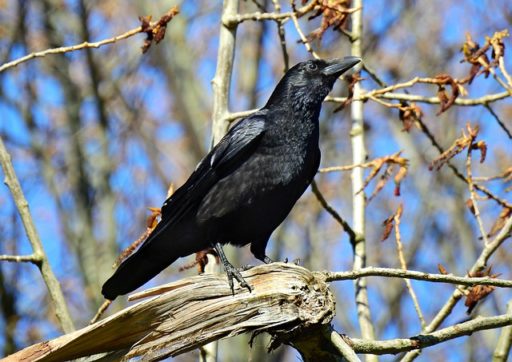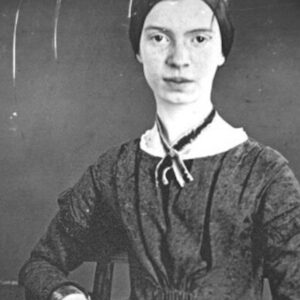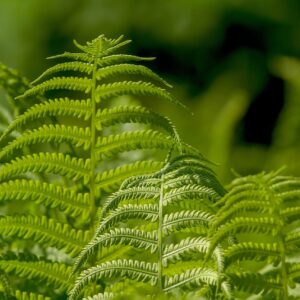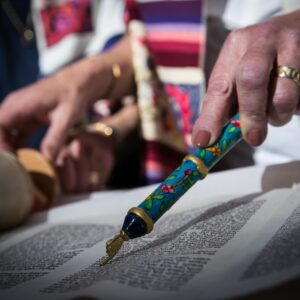I never intended to get Frost’s birds by heart.
For some months I’d been memorizing various of Frost’s lyric poems, moving from one to the next without agenda, allowing my taste for Frost’s wit and craft to guide me. But before I knew it, there they were, his birds, some named, some not: quiet, without fanfare, easy to miss, almost wanting to be missed. And who can blame them? The speaker disparages “The Oven Bird” before it gets to peep, and treats the drowsy nester in “On a Bird Singing in its Sleep” as a mere generic evolutionary specimen. In “A Dust of Snow,” the impish crow high in the hemlock is never actually seen. “A Minor Bird” gets shooed away from the speaker’s front door. The speaker of “Come In” rejects a thrush’s invitation that is never actually made to him. “Never Again Would Birdsong be the Same” has good news for the creatures flying in the bright air above the Garden of Eden, but nothing audible to the featherless bipeds overly focused on their own problems below.
Those aren’t the only birds Frost mentions. I’m saving a couple more of them for a closer look later in this post. But in general (though my unsystematic approach to them may leave an exceptional example out), Frost’s birds belong to a different tribe from the big dramatic characters (nightingale, skylark, and thrush) heard grandly in Keats, Shelley, and Hardy—Frost’s poetic birdwatching predecessors. Keats’ seductively elusive nightingale, Shelley’s vertiginously highflying skylark, Hardy’s bravely battered thrush: these avians make huge demands on the poets celebrating them, not simply to describe them faithfully but primarily to identify themselves with them, to become the birds’ human embodiments in song. Shelley and Hardy give themselves over to this transformative demand; Keats at first follows but finally rejects it. But all three testify right from the beginning to the power of that appeal, and all three are rewarded by those birds with poems of unforgettable power.
And yet to say that Frost’s birds are negligible in comparison with previous poets’ is a misguided conclusion. In fact, Frost’s birds do influence their human observers. The difference is that the influence has to overcome various forms of resistance. Whereas in Keats, Shelley, and Hardy, the poetic witnesses eagerly embrace their birds’ respective invitations, Frost’s speakers fight, reject, disparage, or ignore them. Only at first, though. The delight I get from repeating these poems to myself in waking hours of the night is to savor the clever and even comic ways these resistances are met and more than matched by the birds that provoked them. Frost’s birds, unlike their heroic precursors, don’t expand the human soul so much as deflate it. Our prejudices, fixations, and self-importances don’t survive long in their presence.
An example: “A Dust of Snow”—
The way a crow
Brushed down on me
A dust of snow
From a hemlock tree
Has given my heart
A change of mood
And saved some part
Of a day I had rued.
It’s hard to imagine that the speaker’s first reaction to the crow’s well-aimed dusting wasn’t one of indignant irritation, like that of some strutting stuffed-shirt getting a spray while passing an imp with a garden hose.
The break between stanzas spares us the likely comedic details. The speaker has not only recovered his sense of humor by the second stanza; he has also noted the change for the better in himself as a result of his brush with feathered fate. Yet so preoccupied with his own psyche is he that the speaker doesn’t acknowledge the crow’s service or express some thanks or even wonder about the crow’s good timing. The human subject dominates the text and the bird is allowed to fly off into the blank spaces.
I won’t follow similar comedic avian turns in the other birdwatching poems I’ve mentioned—I invite you, dear reader, to do that for yourself, preferably by memorizing the poems first so that the jokes can unfold at your leisure and you can enjoy a laugh at the poetic persona’s comeuppance at any time of day or night.
But I do want to make good on my promise of a closer look at two other birds. Appearing in Frost’s underappreciated sonnet “Acceptance,” these creatures set what seems to me a healthy example to us humans currently driven into the dark by gloomy apocalyptic fantasies. The fact that their example is lost on the obtuse human who speaks about them puts the onus on us, their human readers, to respond in a more accepting and less melodramatic way.
The speaker’s obtuseness begins with his confusing an ordinary sunset with the end of the world and then blaming all created things for not raising the alarm:
When the spent sun throws up its rays on cloud
And goes down burning into the gulf below,
No voice in nature is heard to cry aloud
At what has happened.
A “spent” sun, an exhausted one, “throws up its rays on cloud” as if in despair. And why not? Look what confronts it: a flaming burn-out and an annihilating plunge into “the gulf below.” No picturesque display of color here, but seemingly a catastrophe of spectacular import.
Yet birds (the speaker remembers) are supposed to be wise, so surely they will react loudly to the calamity.
The birds, at least, must know
It is the change to darkness in the sky.
But, to the speaker’s surprise and indignation, the two representative birds he then mentions don’t view a “change to darkness in the sky” as the total and eternal eclipse the speaker seems feverishly to be imagining.
One bird, sensibly noting the late hour, says a birdy prayer and goes to sleep—
Murmuring something quiet in her breast,
One bird begins to close a faded eye…
True, the other bird is in a bit of a panic, but only because he’s in a race against the clock to get to his nest, and just makes it. But instead of using his last breath to utter violent oaths and dark prophecies, he merely tweets!
At most he thinks or twitters softly, “Safe!
Now let the night be dark for all of me.
Let the night be too dark for me to see
Into the future. Let what will be, be.”
The bird has the last word here. It’s the speaker who disappears into the sonnet’s unwritable fifteenth line. And with a sigh of relief, this human reader, at least, is glad the sonnet form has forced the speaker to shut up. “Let what will be, be” needn’t be—and isn’t here—an expression of spineless passivity to Fate. It’s both a sensible yielding to the natural processes and a firm confidence in the rightness of their ultimate outcome. If night, then day follows.
A simple wisdom, and yet hard to swallow when you’re a mere featherless biped who’s lost his prayer book or can’t find a quiet place to wait out the dark.
After getting his PhD in English literature, George Dardess taught close reading to his own students until his retirement. Since then he has been ordained a Deacon in the Roman Catholic Church and written several books on Muslim-Christian relations. He has also created the graphic novel Foreign Exchange.





